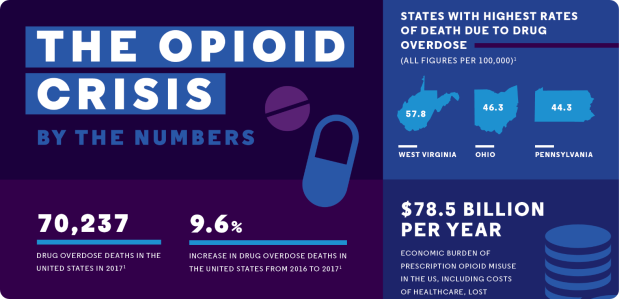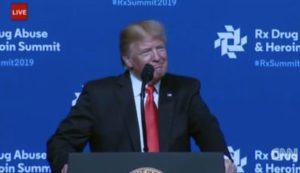President Trump told a drug abuse summit Wednesday in Atlanta that he and his administration will “never stop until our job is done’’ in solving the nation’s opioid crisis.
Trump called the opioid epidemic a “terrible menace’’ and highlighted steps that his administration has taken in battling the problem.
The Rx Drug Abuse & Heroin Summit is an annual Atlanta conference of health care and addiction experts and law enforcement and government officials who work to fight addiction and drug abuse.

“My administration is deploying every resource at our disposal’’ to support anti-drug efforts, Trump told summit attendees. “We will not solve this epidemic overnight.”
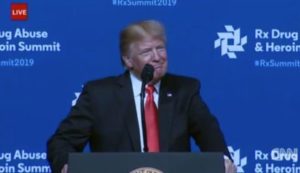
First lady Melania Trump also was on hand, and she spoke of the crisis before introducing her husband. She noted the “terrible toll the opioid epidemic is having on children and young mothers.” The first lady said she is “committed to supporting more treatment facilities that help both mothers and babies recover” from addiction and Neonatal Abstinence Syndrome,
Opioid abuse claimed a record of nearly 48,000 American lives in 2017.
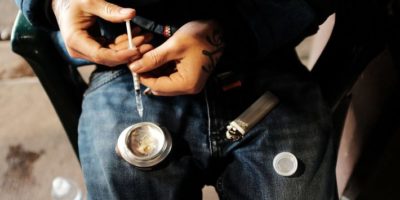
An estimated 2 million people are addicted to opioids, a class of drugs used to reduce pain. They include prescription drugs such as oxycodone and hydrocodone; a synthetic pain reliever, fentanyl, which is often illegally made and distributed; and heroin, an illegal drug that has been a longtime health scourge.
Georgia, like other states, has seen an increase in opioid overdose deaths.
In 2017, there were 1,014 overdose deaths involving opioids in the state — a rate of 9.7 deaths per 100,000 people, compared to the national rate of 14.6 deaths per 100,000, according to the National Institute on Drug Abuse. The greatest increase in opioid deaths was seen in cases involving synthetic opioids (mainly fentanyl): a rise from 61 deaths in 2012 to 419 in 2017.
Deaths involving heroin in Georgia also increased in the same five-year period: from 40 in 2012 to 263 in 2017. The highest number of deaths in 2017 — 568 — involved prescription opioids.
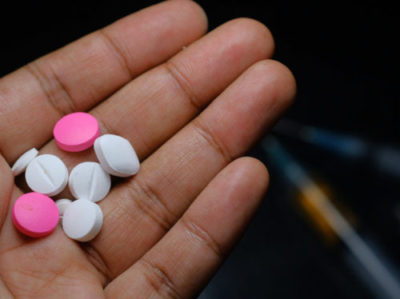
Amid concerns about doctors overprescribing painkillers, the CDC says the overall national opioid prescribing rate declined from 2012 to 2017. And in 2017, the prescribing rate fell to the lowest it had been in more than 10 years.
Georgia, like many other states, is suing opioid manufacturers and distributors, accusing them of fueling the opioid crisis. Georgia Attorney General Chris Carr wants those companies to pay the state back for its efforts to combat the crisis.
In 2017, the states with the highest rates of death due to drug overdose were West Virginia, Ohio, Pennsylvania, and Kentucky, along with the District of Columbia.
Georgia Public Broadcasting reported that the Georgia Department of Behavioral Health and Developmental Disabilities recently received a $10.3 million grant from the U.S. Department of Health and Human Services. The funding will expand access to medication-assisted treatment for opioid addiction and overdose, HHS Deputy Secretary Eric Hargan said, according to the GPB report.
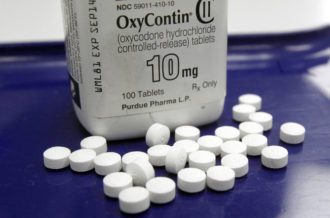
Trump introduced other speakers during his address, including Monty Burks of Tennessee, a recovering addict, and Tom Murphy, a Virginia law enforcement officer who lost his son to a drug overdose.
“The stigma needs to stop,’’ Murphy said. “Don’t judge. Educate.’’
Burks and Murphy, along with a young man and his mother who are both in recovery, received loud applause from the crowd.
NBC News reported that Keith Humphreys, a drug policy adviser to previous presidents from both major political parties, said some states are making progress, but not because of action by Trump. Humphreys said other states have regressed.
Humphreys said Trump’s declaration of opioid addiction as a public health emergency in 2017 failed to translate into significant concrete action.

But Trump said the administration has committed $6 billion to combat the crisis, set aside money to prevent youth substance abuse, and increased the distribution of the overdose-reversing drug naloxone, NBC reported.
Trump pointed out that his administration has allowed states to use Medicaid dollars to pay for residential treatment, and that thousands of inmates have received addiction services through the recently passed criminal justice reform.
Trump also discussed shutting down illegal online drug-selling networks and implementing more aggressive efforts to seize illegal drugs. The president said $19 million in cocaine was recently seized at the Port of Savannah. And he added that his border security initiative would help stop the flow of heroin into this country. On a related note, he mentioned that China, a major source of fentanyl, recently vowed to crack down on manufacture of the drug.
Neil Campbell of the Georgia Council on Substance Abuse said the people who spoke of addiction and recovery on the podium with Trump “were incredible, showing that recovery is real.’’
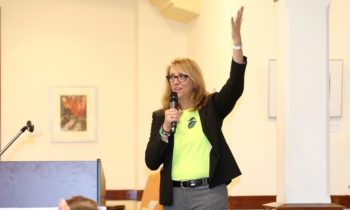
Campbell said there are more financial resources now being devoted to fighting opioids, including money for treatment services. More people are getting the addiction treatment drugs methadone and suboxone, as well as the overdose-reversing naloxone, she said.
She added that she hopes Gov. Brian Kemp’s Medicaid waiver initiative would lead to more people being able to get addiction services, and to an increase in treatment centers in the state.
“States that have expanded Medicaid have seen more people in treatment,’’ Campbell added.
She said that Trump’s stated goal of eradicating opioid abuse “is not realistic, but I think it’s OK to be aspirational.’’
Jeff Breedlove of the Council of Substance Abuse added, “We are thankful that President Trump is committed to eradicating opioid abuse. The Georgia Council on Substance Abuse stands ready to represent the recovery community in working with the administration and our Georgia congressional delegation on this important mission.”
The opioid crisis is one issue that presidents of both parties have emphasized.
President Barack Obama spoke at the summit in 2016, saying that government must spend more money on treatment of people addicted to opioid drugs. The nation’s surging opioid epidemic, he said, “is costing lives and devastating communities.”
Former President Bill Clinton addressed the summit last year, saying the opioid epidemic “creeps into every nook and cranny of our country,” and needs to be addressed as both a huge national problem and a community-by-community tragedy.
Otherwise, he said, “this can rob our country of the future.”
